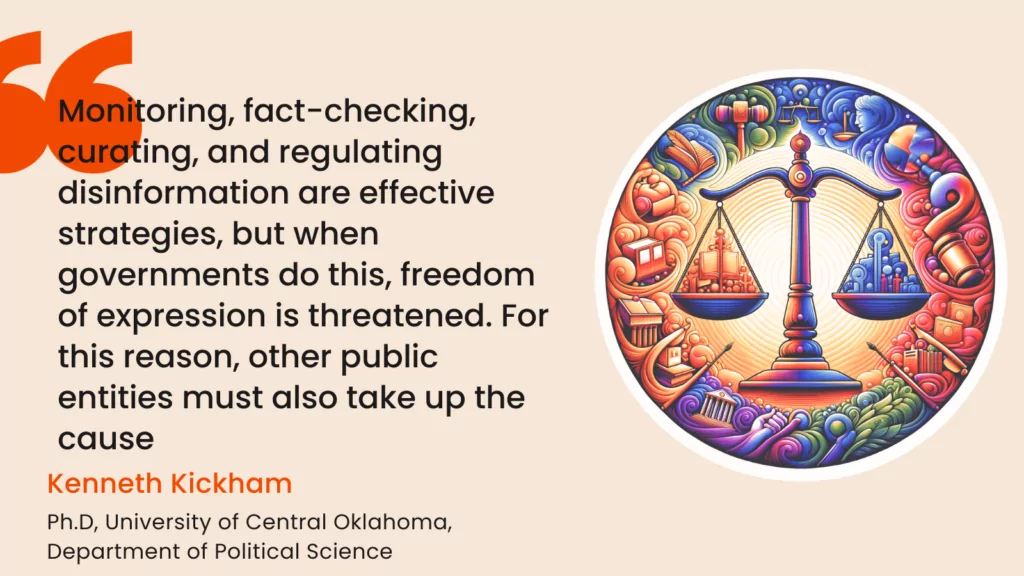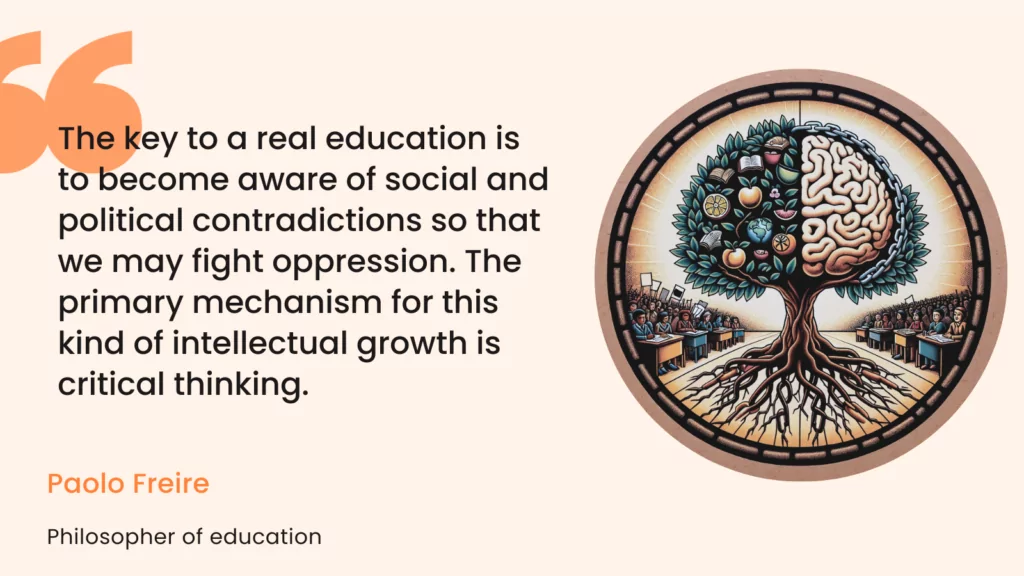Disinformation, and its close relative misinformation, have become a global problem in the age of social media. As educators and students grapple with this complex landscape, the importance of developing critical thinking skills to discern and combat such information warfare becomes paramount. For this reason, we delve into the multifaceted nature of disinformation, the moral outrage it can engender, and the roles of governments, journalists, activists, and, crucially, educational institutions in fostering a society equipped to identify and withstand the onslaught of deceptive narratives.

✅ AI Essay Writer ✅ AI Detector ✅ Plagchecker ✅ Paraphraser
✅ Summarizer ✅ Citation Generator
Key Takeaways
- Fighting disinformation can be a double-edged sword.
- Faculty are well-positioned to confront disinformation.
- Students must cultivate the discernment needed to identify disinformation.
Defining these terms can depend a lot on context, but misinformation is usually regarded as factually inaccurate information, such as ineffective treatments for COVID, that is shared for innocent purposes. Disinformation, on the other hand, can be described as intentionally manipulative information designed to spread propaganda for a political purpose.[i]
Moral outrage stokes the fires of harmful social media engagement.[ii] The family of conspiracy theories we associate with QAnon, for example, feature horror stories of pedophilia and human trafficking. According to the U.S. intelligence community, accusations of corruption, particularly election irregularities and fraud, were initiated and amplified by foreign actors to influence the 2020 U.S. elections via social media.[iii] A common refrain for election deniers is, in the words of former president Trump, “You don’t concede when there’s theft involved.”[iv] This framing invokes moral outrage as it demands action, but the question becomes whether or not “theft” occurred.
Governments Must Be Cautious About Fighting Disinformation

A major goal of invoking moral outrage is to spur people to act. Influencers appeal to emotion to create an atmosphere of polarization, pitting an “us” against a “them.” Sophisticated disinformation uses the techniques of propaganda, including impersonation, discrediting of narratives, and trolling. Counteracting the manipulative use of moral outrage requires concerted effort on the part of governments, institutions, and citizens, but it is mostly an individual responsibility.
Because disinformation can negatively impact election processes, governments have a stake in neutralizing its reach. Monitoring, fact-checking, curating, and regulating disinformation are effective strategies, but when governments do this, freedom of expression is threatened.[v] For this reason, other public entities must also take up the cause.
Journalists, activists, and of course educators are less conflicted when it comes to assessing disinformation and counteracting its effects. News organizations rightfully aim to expose disinformation, while activists seek to counter it with legitimate information. Educators, especially college professors, see their role as empowering students to recognize disinformation for what it is.
Critical Thinking Inoculates Us from Disinformation
A college education encompasses many goals. Students work hard on the subject matter and apply their acquired knowledge when completing assignments and taking exams. We also want to develop and mature as thinking individuals and responsible citizens. Students rely on professors to guide their studies and challenge their preconceptions about life. It is not enough to impart to students an inventory of facts—they also need to learn and develop rigorous ways of thinking.

Paolo Freire, an influential philosopher of education, developed an approach to higher education that emphasized “critical pedagogy.”[vi] From this perspective, the idea is for the student to play an active role in their learning rather than being a passive recipient of knowledge. The key to a real education is to become aware of social and political contradictions so that we may fight oppression. The primary mechanism for this kind of intellectual growth is critical thinking.
Faculty are perfectly positioned to help students learn how to distinguish legitimate information from disinformation. Critical thinking requires a specific set of skills, which are some of the same skills we teach in the context of problem-solving. We evaluate information according to standards of clarity, accuracy, relevance, logical consistency, fairness, and evidentiary support. In other words, learning to think critically helps students distinguish sound intellectual arguments from psychological or emotional appeals.
Helpful Habits and Values
The most reassuring quality that students bring to the classroom is their willingness to grow intellectually. The best students exhibit habits and values that facilitate discernment. Among these qualities are intellectual humility, responsibility, and perseverance.
Intellectual humility steers us away from shallow, subjective reactions to new information, prompting us instead to reason deeply and objectively about its validity. When first encountering new information, we tend to react with gut feelings, so it is important to pause and clarify the questions posed or addressed by the information. We must also try to identify any unstated assumptions, but nevertheless drive the assertions.
Intellectual responsibility demands that we focus on matters of significance instead of getting caught up in trivial distractions. By examining alternative points of view, in the interest of fairness, we can find common themes and distill the essential elements of a situation as we develop logical and valid conclusions about the accuracy of the information.
Intellectual perseverance requires completeness in evaluating an argument, rather than fragmentary or selective analyses of one of the argument’s elements. This involves gathering relevant data from independent sources, especially alternative points of view, which we would also need to evaluate critically and objectively. Perseverance includes tracing the significant implications of information being presented and subjecting these implications to standards of logical consistency and evidentiary support.
Conclusion
Controversies, and the conflicts they entail, feed off disinformation, which threatens not only our democratic processes but also our rights as individuals in a free society. Fortunately, academia can play an important role in combatting the malign effects of disinformation. By cultivating the traits and skills that promote critical thinking, professors and students empower efforts to combat disinformation.
Useful Resources:
- [i] Colomina, C., Sanchez Margalef, H., & Youngs, R. (2021, April). The impact of disinformation on democratic processes and human rights in the world. European Union, Brussels.
- [ii] McLoughlin, K. L., Brady, W. J., & Crockett, M. J. (2021, November 3). The role of moral outrage in the spread of misinformation. TMS Proceedings 2021.
- [iii] National Intelligence Council. (2021, March 10). Intelligence community assessment: Foreign threats to the 2020 US federal elections. Office of the Director of National Intelligence.
- [iv] Savage, C. (2021, January 12). Incitement to Riot? What Trump told supporters before mob stormed capitol. New York Times.
- [v] Bontcheva, K., & Posetti, J. (2020, September). Balancing act: Countering digital disinformation while respecting freedom of expression. UNESCO.
- [vi] Giroux, H. A., (2010). Rethinking education as the practice of freedom: Paolo Freire and the promise of critical pedagogy. Policy Futures in Education 8(6), 715-21.
Follow us on Reddit for more insights and updates.





Comments (0)
Welcome to A*Help comments!
We’re all about debate and discussion at A*Help.
We value the diverse opinions of users, so you may find points of view that you don’t agree with. And that’s cool. However, there are certain things we’re not OK with: attempts to manipulate our data in any way, for example, or the posting of discriminative, offensive, hateful, or disparaging material.